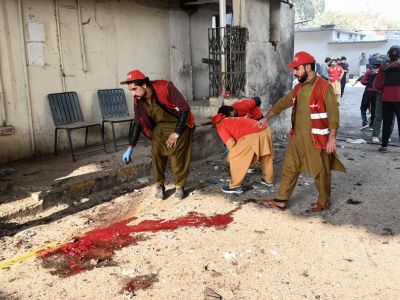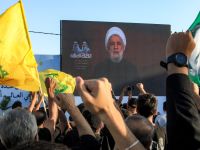Nigerian police Friday charged the leader of a militant ethnic group, blamed for riots in which hundreds died, with 23 counts of murder, robbery and illegal possession of arms.
Ganiyu Adams, leader of the most violent faction of the banned Odua People's Congress (OPC), and three others were brought to the Ikeja Magistrate's Court here, handcuffed and in shackles.
All four pleaded not guilty to all charges which Adams said, in a brief statement to the court, were politically motivated.
Adams declared himself a Yoruba "freedom fighter" who was being victimized for fighting against domination of the southwest by the allies of the northern-led military and ethnic Hausa people.
"I am not guilty. If you say that I am guilty the Yoruba race is guilty. ... I am a freedom fighter. ... I am not a murderer," he said.
"They have threatened to jail me at all costs for fighting against their race," he added.
The OPC, set up in 1995 to fight for autonomy for the ethnic Yoruba people of southwest Nigeria, is accused by the police of responsibility for a series of murders and for riots in 1999 and 2000 in Lagos in which hundreds of northern ethnic Hausa died.
It is also accused of orchestrating attacks on the police and the murder of a senior police officer last year.
Lawyers for Adams said the court had no jurisdiction to try the case and called for it to be dismissed.
Presiding judge Olatunde Isaac accepted a prosecution plea for time to prepare the case and adjourned the trial to September 14.
OPC supporters had ringed the court ahead of the brief appearance and chanted support as Adams was brought out of a police vehicle.
When he left, Adams flashed supporters a V-for-victory sign.
Police said earlier they were prepared to ensure security in the city and dismissed a warning made by the OPC Thursday that they would make Lagos "ungovernable" if he were not released.
"We are prepared for anything but we are not expecting trouble. When you arrest the general, the troops cannot stage a battle," a spokeswoman for Lagos State police chief Mike Okiro told AFP.
Adams was declared wanted in late 1999 and a 100,000 naira (900 dollar) reward, the equivalent of three times the average yearly salary here, was offered last year on information leading to his arrest.
The OPC was officially banned in October 2000.
The OPC, despite its violent reputation, has broad support among senior leaders of the Yoruba people.
In an interview with the newspaper The Guardian, the leader of the Yoruba Council of Elders said it was wrong to treat Adams as a criminal but urged that supporters remain peaceful.
"Ganiyu Adams should not be treated as a criminal because the whole Yoruba nation believes that the OPC is out to salvage the bad security situation in Yorubaland," Adewale Thompson said.
Since it was set up in 1995, following the annulment by the northern-led military of elections apparently won by a Yoruba politician, the OPC has been the source of considerable controversy.
Supporters, including respected human rights activist Beko Ransome-Kuti, say it is non-violent and helps, through vigilante activities, to fight crime in Yoruba areas.
But its opponents, including non-Yorubas, the police and the government, say it is a violent ethnic-nationalist or tribalist organization and hold it responsible for the hundreds of deaths -- LAGOS (AFP)
© 2001 Al Bawaba (www.albawaba.com)









